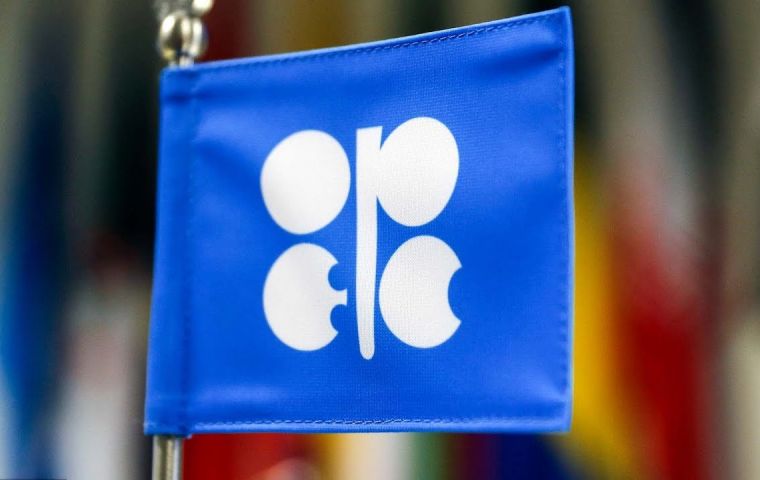MercoPress. South Atlantic News Agency
OPEC and Russia+10 will increase output, 400,00 bpd, as of August first
 Misunderstandings between Saudi Arabia and UAE had delayed previous meetings leading to Sunday's agreement
Misunderstandings between Saudi Arabia and UAE had delayed previous meetings leading to Sunday's agreement The world's leading oil-producing countries agreed on Sunday to continue with the gradual increase of output, 400,000 barrels per day, beginning August first, to help global economic recovery following the pandemic, according to a release from the group's meeting in Vienna.
The meeting involved the thirteen OPEC members and the so-called +10 under the leadership of Russia. The organization will again assess market developments next December. Since last May OPEC and Russia's +10 have been increasing oil production, following a full year freeze, given the plunge of demand caused by the coronavirus. In April 2020, OPEC and Russia's 10 agreed to voluntarily withdraw from the market 9,7 million BPD, and reintroduce them step by step before the end of April 2022.
Under the terms of the agreement signed on Sunday the cap date of April 2022 has been extended to the end of next year, since it considers that the demand's current recovery rhythm is still suffering from the consequences of the pandemic. The cartel's target is a return to production levels from before the pandemic since OPEC + are still pumping 5,8 million BPD less than when the virus appeared.
Sunday's discussions which had in a previous meeting been interrupted because of misunderstandings between Saudi Arabia and the United Arab Emirates allowed on this occasion to reach an understanding with the basic production quota for UAE of 3.5 million BPD, in May 2020, instead of 3.17 m BPD. Higher original quotas mean they will have a greater production share as markets normalize. But this means that the quotas of other countries will also have to be adjusted, such as Iraq, Kuwait, Russia and Saudi Arabia.
This anticipates a complex equation and situation, given the still-fragile recovery of oil demand, the soon to arrive Iran oil exports and the high prices which have triggered a negative reaction from the large importers in India. Since autumn 2020 the OPEC + members have been meeting frequently to assess the market, and the next one is scheduled for September, according to Sunday's Vienna official release.
Furthermore, influence changes have been taking place inside OPEC, with Saudi Arabia losing clout, given its disastrous leadership of the coalition in the Yemen war, which led UAE to abandon the conflict and side closer to the US and establish diplomatic relations with Israel. The ruling prince in Riyadh still has to respond to the disappearance of journalist Jamal Khashoggi at the Saudi consulate in Istanbul, and other capricious decisions.




Top Comments
Disclaimer & comment rulesCommenting for this story is now closed.
If you have a Facebook account, become a fan and comment on our Facebook Page!